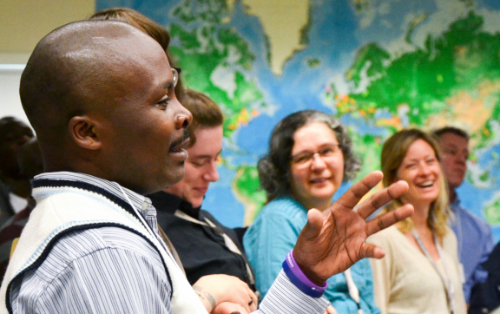Want to improve the success of your development program? Try soft skills
August 28th, 2019 | SIT Graduate Institute

By Bruce W. Dayton
In a world full of complex challenges, development practitioners have their work cut out for them. But there is one low-cost intervention practitioners can use to help make projects more sustainable and better positioned to cultivate durable relationships.
Soft skills.
The soft skills approach starts with the idea that global development initiatives require more than just technical know-how to succeed. Also required is a capacity for stakeholders to communicate with each other across cultural and socioeconomic divides, to develop collaborative practices, and to actively manage disputes and conflicts as they arise. This is particularly true in fragile and post-conflict settings where political, social, and cultural differences can exacerbate mistrust and historical animosities to thwart even the best-intended efforts.
Two people approaching a technical problem and working together to solve it will never succeed if they lack a capacity to work across cultural and political gulfs or to acknowledge the divides and animosities that separate them. That’s why development practitioners must invest not only in essential technical training, but also in development of soft skills such as empathy, dialogue, negotiation, mediation, intercultural communication, critical thinking, and decision-making.
Soft skills, in other words, smooth the way. They help people understand one another’s experiences and recognize that truth in social settings is often subjective. This important starting point for conflict transformation and collaborative development practice can be achieved through experiential learning exercises that ask people to reflect on and interpret their experiences in group settings, allowing them to confront their biases on their own terms and without judgment.
In fact, soft skills training is an integral part of the curriculum for students pursuing the Peace and Justice Leadership master’s degree at School for International Training (SIT) as well as for our Conflict Transformation Across Cultures (CONTACT) program.
In these trainings, I first ask students to describe their own “deep story” and personal identity, then speculate about the story and identity of another participant. When they reflect on the difference between these two portraits, one rich and the other shallow, they begin to understand the limitations of their perspective, and the biases and assumptions that cloud their capacity to “see” the other.
This kind of activity promotes the sustainability of a development project. People take full advantage of their shared technical skills only when they’re equipped to confront their own biases, listen to the stories of others, and understand those stories as the product of experience. Once they’ve done so, group social and cultural capital is established that can make it easier to connect in the future, too, when project implementers are long gone.
Soft skills also promote a project’s longevity because they allow practitioners to be more inclusive. Often, development projects bring together people who already buy into the peacebuilding narrative and exclude people seen as spoilers to the project’s success because they might not have the skills or experience to engage with their counterparts. With sufficient soft skills training, practitioners can include those people — which, in turn helps, the project gain legitimacy locally.
My colleagues at World Learning, a global NGO that is a sister organization to SIT, have proven how soft skills can make a difference in global development.
Last year, more than 250 alumni of the Iraqi Young Leaders Exchange Program (IYLEP) gathered in Baghdad to share how they’re driving change in their country. There were so many impressive stories. IYLEPers are fighting to end gender-based violence, building relationships between Iraqi police and the communities they serve, and rooting out sectarianism by promoting tolerance and diversity.
Soft skills are at the core of IYLEP, which is sponsored by the U.S. Department of State and brings Iraqi high school students and undergraduates of diverse ethnic and religious backgrounds to the U.S. to learn about leadership, peacebuilding, and civic engagement. In addition to developing practical hard skills like project planning and management, IYLEP helps participants gain the skills they need to be effective leaders.
IYLEP’s soft skills training has proven effective. In World Learning’s evaluation of the program — which recently celebrated its 10th year — 93 percent of participants said they left with improved listening, teamwork, leadership, and dialogue skills. Another 90 percent reported using those skills to form or lead community organizations.
This training also had an unexpected yet unsurprising consequence: Alumni have reported a greater capacity for empathy and appreciation for diversity in all its forms. In fact, 85 percent of respondents indicated that IYLEP training helped them support marginalized groups. One respondent noted that “engaging with people with different religions, Shiites to be specific, has become a lot easier for me.”
Of course, soft skills are not a panacea. Structural inequalities and embedded norms such as those pertaining to gender roles stand in the way in certain contexts. That’s why the global community must also continue to work on good governance, civil society capacity building, reducing inequality, and other challenges.
Research is also sorely lacking in this realm. There has been evidence that soft skills help achieve positive outcomes in sexual and reproductive health and preventing youth violence — and, indeed, skills such as empathy, communication, and problem-solving are at the heart of UNESCO’s Global Citizenship Education (GCED) initiatives. But while we know from experience that soft skills make a difference in development projects, we don’t have enough data points to understand how much of a difference and under what conditions they have the biggest impact.
As a community of development practitioners, let’s challenge ourselves to do that research. It may seem daunting, but soft skills training costs next to nothing in the context of a multimillion-dollar development contract, and it offers clear returns. We may even learn that the increased sustainability and impact of a project more than compensates for the modest expenditure of soft skills training.
It’s past time to find out.

Dr. Bruce Dayton is the executive director of the Conflict Transformation Across Cultures (CONTACT) program and chair of the Peace and Justice Leadership master’s degree at School for International Training (SIT).
